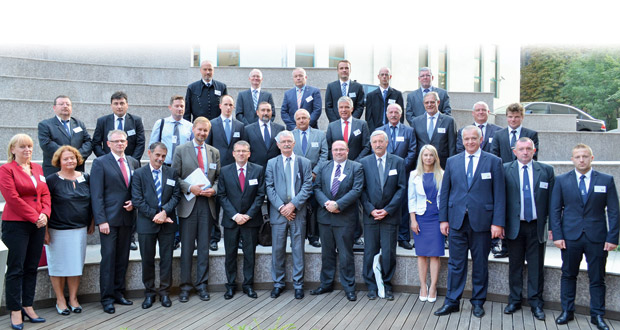At the invitation of the Romanian National Institute for Research and Development in Mine Safety and Protection to Explosion (INSEMEX Petrosani), the 22nd meeting of the head of the top mining authorities in states of the European Union took place on 13th and 14th September 2016 in Bucharest (Figure 1). The meeting was attended by representatives of the mining, environment, and safety authorities from Germany, the Czech Republic, Estonia, Finland, Hungary, Poland, Northern Ireland, Great Britain and Slovakia, as well as representatives of the ministers responsible for mining in Austria, Germany, and Serbia.
The general themes of the meeting were mine safety and ensuring the supply of raw materials. As in previous years, prior to the specialist presentations, the country representatives began with a brief overview of the current raw materials situation in their country. The market supply of construction raw materials was generally viewed as good. However, the accessibility to, and therefore availability of, high-quality deposits of ore and energetic raw materials is often characterised by difficulties. On this subject, the participants of the meeting addressed the need for a higher awareness of raw materials, including at EU level. The aims of securing the European supply of raw materials are being achieved in particular by the extraction of domestic raw materials in the EU according to the highest international standards. The representatives of the individual states presented various best practice examples.
In terms of a secure energy supply, there was a consensus that in the future, we must continue to rely on the resources of oil, gas, lignite and coal available in the EU. Here, a clear commitment to the EU climate targets conflicts with the necessity for a reliable and affordable energy supply. The route involving de-carbonisation in the energy supply was considered long and difficult, particularly by the representatives from Eastern Europe. The delegate from the German state of Brandenburg held a presentation describing the current challenges posed by the German energy transition. A lack of synchronisation between the generation of renewable energies and network expansion, a shortage of storage options and the continual rise in energy costs due to the expansion of renewable energy were identified as action areas for the years ahead.
In the afternoon session, the agenda focussed on a discussion of mining accidents in the past year. The representatives from Austria, Serbia, Great Britain and Northern Ireland reported on specific incidents and highlighted the resulting consequences for occupational safety. It was agreed that this exchange based on real-world experiences should be continued.
On the second day of the conference, all delegates travelled together to the visitor mining centre at Salina Veche in Slănic approximately 100 km north of the capital city of Bucharest. Salina Veche is special because of its unusually large excavation cavities, which are accessed via a ramp at a depth of approximately 200 m. At a height of 54 m, a horizontal extension of the individual chambers by up to several hundred metres and a total cavity volume of 2.9 m m3, the excavation cavities are the result of intensive salt mining from 1943 to 1970. Since the mines were decommissioned, Salina Veche has been used as a visitor mine. In addition to tourists, the mine attracts a large number of visitors seeking the healing powers of the mine air with its constant temperature and low humidity.
The conference participants thanked the delegation from Slovakia for the invitation to the 23rd meeting in 2017. The representation from Austria volunteered to host the 24th meeting in 2018.
(Freytag/Cramer/Si.)
